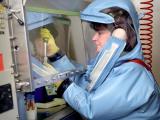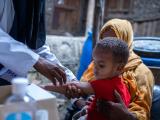Sep 23, 2003 (CIDRAP News) The leaders of the Johns Hopkins Center for Civilian Biodefense Strategies (CCBS) in Baltimore, probably the nation's best-known biodefense policy institute, announced last week that they are leaving Johns Hopkins to launch a new biosecurity center with the University of Pittsburgh Medical Center (UPMC).
Tara O'Toole and Thomas V. Inglesby, director and deputy director of CCBS, said in an e-mail announcement that they will launch and direct the Center for Biosecurity of UPMC as of Nov 1. They said most of the CCBS faculty and staff will also join the UPMC center, which will be headquartered in Baltimore but have offices in Pittsburgh and Washington, DC, as well.
D. A. Henderson, MD, MPH, founder of CCBS and former dean of the Johns Hopkins Bloomberg School of Public Health, will also join the UPMC project, according to O'Toole and Inglesby. Henderson will be a special adviser to the center and a professor of public health and medicine at the University of Pittsburgh, according to a Baltimore Sun report. The report said O'Toole, Inglesby, and Henderson will remain in Baltimore.
The aim of UPMC will be to link biodefense policy development with medical training, healthcare, and public health through UPMC's 19 health maintenance organizations and hospitals and its connections with local public health agencies, according to a CCBS statement.
"The new Center for Biosecurity will allow us tremendous opportunities to expand the analysis and strategy initiatives that we have undertaken in the past 5 years and to couple them with the development of medical and public health operational systems that we believe are crucial for biopreparedness," O'Toole and Inglesby stated.
Their announcement came the same week the Johns Hopkins Bloomberg School of Public Health announced the formation of a new institute to gather the school's various biodefense and public health preparedness research and training efforts under one umbrella. The new organization is called the Institute for Global Health and Security, according to a Johns Hopkins news release. It will include several existing centers, including the CCBS, officials said.
Tim Parsons, a spokesman for the Hopkins School of Public Health, told CIDRAP News the four full-time faculty members and 16 administrative staff members of the CCBS are all leaving Hopkins to join the UPMC. "No decision has been made exactly what to do with the Center for Civilian Biodefense Strategies, whether it'll have a new direction or mission incorporated into some other center," he said. "But its biodefense activities will be incorporated in some way into the new initiative of the Institute for Global Health Security."
CCBS officials said their decision was triggered by an "unsolicited proposal" from UPMC to join in forming a "university-based, integrated program of biodefense policy and practice." The statement cited an "imperative national need to fully integrate biodefense policy with a mature health care system that is positioned to test and model 'best practices' for biodefense-related medical training, health care delivery, and public health."
Officials also said the CCBS, to maintain its leadership, needed to at least double in size and develop working relationships with hospitals and local and state preparedness programs. They said the UPMC leadership has established a "generous endowment" for the new center.
Formed in 1998, the CCBS assembled a group of experts, the Working Group on Civilian Biodefense, to write comprehensive papers on the medical and public health management of the six major bioweapons-related diseases. The group also publishes Biosecurity and Bioterrorism, a peer-reviewed journal on biodefense, and it has lobbied for and otherwise promoted increased federal funding for biodefense.

















